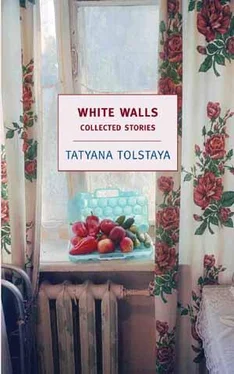Zhenechka would catch us at the front door or in the garden, and excitedly thrust photographs at us for the umpteenth time: Zhenechka on a Finnish sofa in the living room, Zhenechka with her great-nephew—her new, adored pupil—clinging poignantly to her hand (what’s his name again, Zhenechka? Koko or Pupu?), Zhenechka in the dining room at dinner: lettuce leaves and a couple of green weeds.
“They’re very thrifty. And they follow a strict diet.”
We looked at Zhenechka’s belatedly blackened eyebrows and yawned, listening as she sang her hymns to the untold riches of the fish stores.
“But Zhenechka, do they have sprats in tomato sauce?”
“No, now I don’t think I saw any sprats.”
“Well, there you are. How about Wave fish paste?”
“I don’t think so.”
“Well, then! They’re way behind us! Just look, our shelves are filled with them!”
And earnest Zhenechka did her best to argue and persuade.
“And where did you go while you were there?”
“Oh, I stayed at home. I took care of my great-nephew.”
“And them?”
“They went to the Azores. They’d already bought the tickets,” she said in justification.
So while the relatives lolled about on ocean beaches, the infatuated Zhenechka watered, weeded, and coddled her new sapling with the stubbornness of an insane gardener; she drew the barbarian alphabet on blue paper, so that the boy could meet his suntanned parents with a Russian poem or unpronounceable greeting. On her return to Leningrad, she took to writing postcards, choosing the prettiest: bouquets, golden Petersburg bridges, and the statue of the Bronze Horseman (her relatives mistook Peter the Great on his horse for the anarchist Kropotkin). And new love, which never comes too late, thundered and raged and cascaded over her from head to toe.
And we believed that Zhenechka was immortal, that youth can return, that a candle once lit will never go out, and that virtue, whatever we might think of it, will eventually be rewarded.
We’ll choose a day, lock the doors behind us, descend the cold staircase, go out into the stuffy morning city, and leave for the dacha. Out there, pink grass sways and rustles in the warm wind, pine needles cover the old porch; with a slight shush there passes through the emptied, abandoned house the shadow of a shadow of she who once lived, simple as a leaf, clear as light, still as morning water: she who once naively desired to be most beloved.
We’ll step off the train onto the bare cement platform, walk under the aspen hum of the wires and on—through marsh and thicket, across hills and copses—to where the empty house sleeps beyond the glades of overgrown fireweed, where lilac has gone wild, where a crow taps his beak along the porch, where mice say to one another: “Let’s live here for a while.”
We wade through the grass, parting the dense overgrowth with our hands like swimmers; we find the long-forgotten keys and look around, stretching arms numb from the weight of the bags. It’s a damp, lushly blooming northern June. The old, crooked dacha sinks into the grass like a half-drowned boat. Lilac darkens the rooms, pines have crushed the veranda’s fragile breast. The brittle fifes of bedstraw have opened their white umbrellas; disturbed, a mysterious young bird cries loudly; and tiny veronica blossoms litter every sunny clump of dry earth with dark blue.
There are no roads or paths in the ocean of grass yet, the flowers are not yet crushed, only a slight corridor can be discerned where we walked from the gates to the porch. It’s a shame to break the dense, stiff clusters of lilac—a blue, snowy shadow lies on them as on a new-fallen, sparkling crust of ice. It’s a shame to trample the quiet, thick grass forests.
We drink tea on the veranda. Let’s spend the night. Why don’t we ever come here? We could live here! But it’s a long way to lug supplies. We should weed out the nettle. Plant some flowers. Repair the porch. Prop it up somehow. The words fall into the stillness, the impatient lilac has burst through the open windows and sways as it listens to our empty promises, our impossible projects, our rosy dreams fading in an instant: it’s not true, no one will come, there is no one to come, she’s gone, she’s a shadow, and the night wind will blow away her dilapidated dwelling.
Once again Zhenechka packed her bags to go visit her Finnish relatives: for the baby an ABC book, for the nephews something stronger. She was only waiting for the letter, and it arrived. The relatives came straight to the point—they couldn’t invite dear Eugénie to visit them anymore. She would understand, of course; after all, she had reached such a venerable age that what had happened to their neighbors’ Aunt Nika could happen to her any minute. And enclosed was a photograph of this aunt in her coffin, all dressed up and motionless, surrounded by Russian Orthodox lace and Finnish bouquets. Look how badly Aunt Nika behaved; if dear Eugénie were to do the same thing during her visit there might be complications, trouble, misunderstandings… and who would pay for it all? Had dear Eugénie considered this? And she needn’t write anymore, why strain her eyes—and she might get a cramp in her hand!
Zhenechka stood and stared at the photograph of an unknown old lady in a neat coffin, a graphic reproach to Zhenechka’s lack of foresight. And the nightingale that had sung songs on her chest for many years grew deaf and shut its eyes tight. And fate, like a black wind flying into an open window, turned, stuck out its tongue, and shouted, “Just try and be most beloved!” and with a deafening cackle snuffed the candle out.
…A light Karelian night. There’s neither darkness nor crimson dawn: an endless white dusk. All the colors have drained away; the grainy half-moon seems a cloudy brushstroke in the luminous heights; gray garden shadows and crevasses of clotted twilight crawl along the earth; between the tree trunks in the distance, the flat lake glimmers in lackluster coves. A mosquito whines, eyes close. There’s a rustling in the gray grass, the creak of cracked shutters. Overnight yet another colored pane will fall from the veranda, overnight the grasses will rise still higher, the path we walked in the morning will be swallowed up and our footsteps will vanish; fresh mold will bloom on the front porch, a spider will spin the keyhole shut, and the house will fall asleep for another hundred years—from the underground passages where the Mouse King roams, to the high attic vaults from which the fleshless steeds of our dreams take flight.
Translated by Jamey Gambrell
NINA WAS a marvelous woman, an ordinary woman, a doctor, and it goes without saying that she had her right to personal happiness like everyone else. Of this she was well aware. Nearing the age of thirty-five after a lengthy period of joyless trial and error—not even worth talking about—she knew precisely what she needed: a wild, true love, with tears, bouquets, midnight phone vigils, nocturnal taxi chases, fateful obstacles, betrayals, and forgiveness. She needed a—you know—an animal passion, dark windy nights with streetlamps aglow. She needed to perform a heroine’s classical feat as if it were a mere trifle: to wear out seven pairs of iron boots, break seven iron staffs in two, devour seven loaves of iron bread, and receive in supreme reward not some golden rose or snow-white pedestal but a burned-out match or a crumpled ball of a bus ticket—a crumb from the banquet table where the radiant king, her heart’s desire, had feasted. Well, of course, quite a few women need pretty much the same thing, so in this sense Nina was, as has already been said, a perfectly ordinary woman, a marvelous woman, a doctor.
Читать дальше












